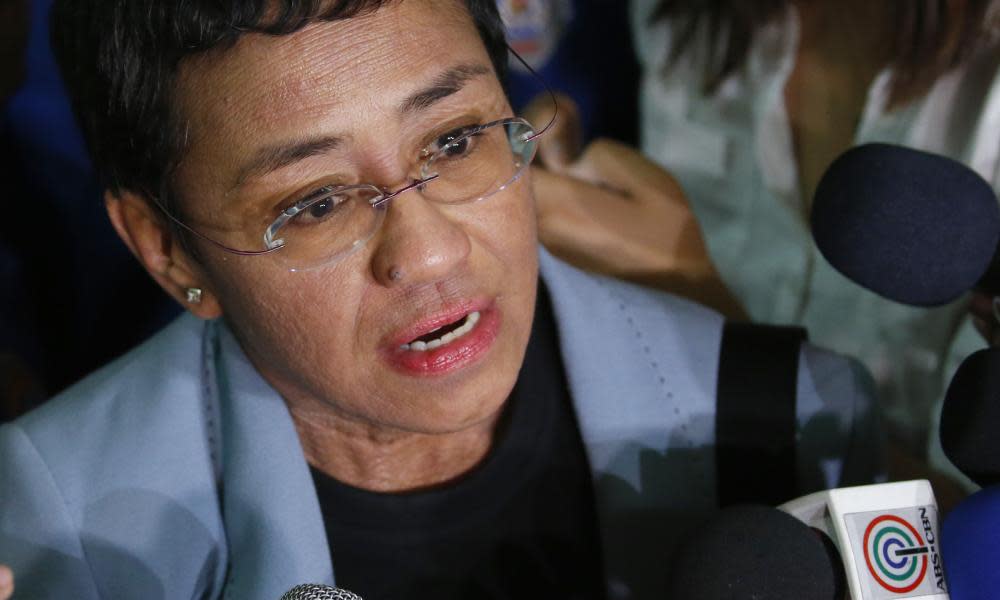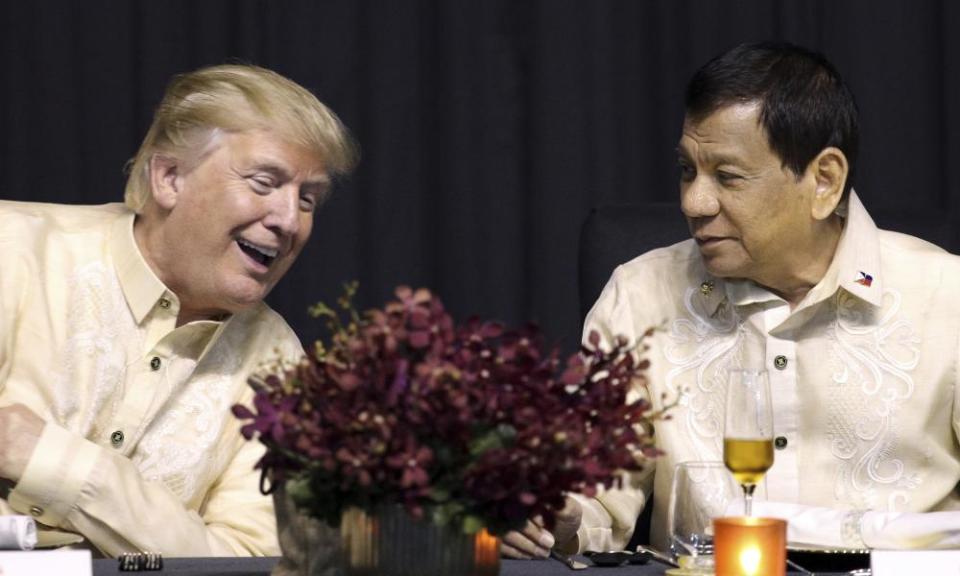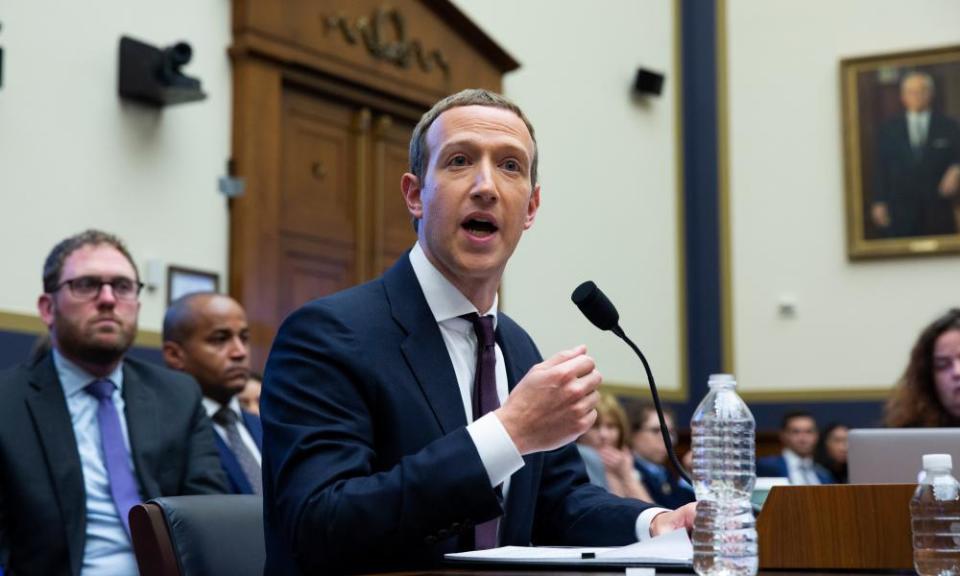Rappler editor Maria Ressa: 'They could shut us down tomorrow'

“The toughest part is not knowing whether it’s going to be a normal day, or a not normal day,” says Maria Ressa, speaking by phone from her office in Manila. A former CNN bureau chief who spent two decades as an investigative reporter, Ressa is the founder of a news website that has found itself on the frontline of the global disinformation wars.
Since the summer of 2016, her reporters at Rappler have been engaged in a running battle with paid trolls, influencers, bot armies and fake news websites run by supporters of Rodrigo Duterte, the authoritarian president of the Philippines.
Launched on Facebook in 2012, before emerging as a fully fledged news website with a monthly audience of 12 million, Rappler was among the first publications anywhere in the world to shine a light on how a populist leader could harness social media to win power.
Ressa’s commitment to exposing corruption, propaganda and thousands of extrajudicial killings sanctioned by Duterte in his self-proclaimed “war on drugs” has made her some powerful enemies. But her determination to speak has also won her many allies.
Related: Maria Ressa: everything you need to know about the Rappler editor
In 2018, she was one of a group of journalists named as Time magazine’s person of the year. All of the others lauded by the US journal were at that point either dead or in detention. Ressa lives every day knowing that both of these fates could befall her.
Security measures have been increased six times at Rappler’s offices in the past year, and Ressa has protection at home, too. A Princeton graduate raised in the US, she is a dual national. Returning to the US might be the safest option. But for now, it is not on the cards. “I hate it, but I can’t leave. This time matters. It’s why we do what we do.”
On 3 April, Ressa will learn the outcome of a libel trial brought against her. If she loses, the sentence is a maximum of 12 years: in the Philippines, defamation remains a criminal offence. Other regime-led prosecutions are pending, for allegations ranging from tax offences to foreign ownership. She has been arrested and bailed eight times in the past year. Ressa has assembled a formidable defence team of 40 lawyers, including the London barrister Amal Clooney. If found guilty on all counts, she faces up to 83 years in prison.
She is braced: “I’m preparing to lose every case here. They could shut us down tomorrow. But we will fight everything, both in court and by telling stories. Our fame is our only protection.”
Rappler is not alone in feeling the heat. In a sign that the outlook for independent journalism in the Philippines is fast deteriorating, the solicitor general filed a complaint on Monday against ABS-CBN, which could lead to the broadcaster losing its licence.
The online playbook developed by Duterte, 74, while he was still a city mayor has by now become familiar. It is being repeated the world over, with populist leaders from Donald Trump to Brazil’s Jair Bolsonaro adopting its toxic mix of viral disinformation and intimidation of independent media.
In the UK, there are parallels with the tactics employed during the EU referendum, and more recently the bullying of the BBC and other media by the team that surrounds Boris Johnson.

But Duterte’s campaign preceded the Brexit vote and Trump’s election. Rappler was discovering the playbook as it was being written. It did so by mapping Duterte’s hidden networks, an effort that eventually led to the creation of a monitoring tool capable of scraping information from across the internet.
Rappler’s Sharktank database began as a spreadsheet listing 26 suspected fake accounts, and has evolved into a vast information-gathering machine. As of October, it had captured data on posts and comments from 6,000 public Facebook groups and 48,000 public Facebook pages, alongside links posted each day from more than 2,700 separate websites.
“I feel like a Cassandra,” says Ressa. While her personality is sunny, her prophecies are bleak. She believes that the rise of hard-right leaders has been made possible by the failures of those who control the web’s biggest forums. “If the social media platforms don’t take the gatekeeping seriously they will kill the public sphere. If we don’t get this right in 2020 you can open a decade or longer of a descent into fascism. And it will be global because platforms are global.”
As Ressa tells it, Duterte’s foray into social media began in earnest in January 2016, six months before the election, when executives from Facebook flew in to train presidential campaign teams. For the Philippines, with its population of 105 million, Facebook is the internet. Everyone who is online has a page. The platform often comes pre-installed on mobile phones.
Already into his seventies, Duterte embraced the new medium. With a fraction of the campaign spend of previous presidents, his team used online engagement to dominate the debate. At first he courted Rappler, but after his election, there was a falling out. Duterte supporters began using the word “presstitute” to slander reporters critical of his methods.
In August 2016, Ressa travelled to Facebook’s regional headquarters in Singapore with her initial list of 26 suspected fake accounts, all supporting Duterte, which she estimated had in turn influenced 3m other accounts. She asked for them to be taken down. No action was taken.
Days later, a bomb killed 14 people in Duterte’s home town, Davao City. Ressa’s team noticed his followers were posting links to the same article, entitled “Man with bomb nabbed at Davao checkpoint”. The headline gave the impression the government had acted quickly. It was a false impression: the article was five months old.
Using data and human sources, Rappler uncovered the campaign’s online architecture. Created for the election, it appears to have been maintained after Duterte entered office. At its core, a volunteer network of more than 400 individuals was organised into four groups, three for the main Filipino islands and another for the country’s diaspora of overseas workers. Each group created its own content, but followed key daily messages issued from the centre.
Duterte’s campaign claimed to have used only unpaid volunteers. But Rappler sources alleged there were trolls being paid 100,000 pesos (£1,500) per month, twice the average salary. Real-world influencers allegedly served as the main centres of attacks, their tweets and posts amplified by armies of fake and genuine accounts. Some of those influencers have since been awarded government posts.
In October 2016, Ressa began to publish her findings. The retaliation was immediate. She was inundated with hate messages, up to 90 per hour, threatening rape, murder and violence against her family. Over the next year, she spoke to 50 Facebook executives, urging them to rein in the disinformation and verbal attacks. She lunched with Facebook’s founder, Mark Zuckerberg, and his chief operating officer, Sheryl Sandberg. To no avail – the troll pages remained online.
In 2017, Duterte used his state of the nation address to attack Rappler by name. In February 2018, Rappler’s correspondent was shut out from government briefings. Its regional reporters were then blocked from attending any Duterte events.
Finally, in October 2018, Facebook took action. It announced the removal of a “spam network”, comprising 95 pages and 39 accounts in the Philippines. A further 200 pages, groups and accounts were removed in March 2019. But the reason given was not disinformation.

The removal was triggered by what Facebook described as “coordinated inauthentic behaviour”. What has become clear is that while Facebook will remove fake accounts, it will not delete lies. Challenged during a formal hearing in the US congress last October, Zuckerberg defended this stance, saying voters should be able to “see for themselves” the statements of politicians.
Ressa says legislators must find a financial incentive for Facebook to police content. Libel laws do not tend to apply to social media platforms in the way they do to newspapers or broadcasters. Facebook is not answerable in court for the false information posted on its pages.
There is a chink of light in Ressa’s story. After months of verbal attacks, she was arrested for the first time on 13 February 2019, spending the night in detention before being able to post bail. Outrage at her treatment gathered momentum and, for the first time, the online tide turned in her favour. The Sharktank maps showed real Facebook users rallying to her defence against the bots.
“After I got arrested the Filipino government unshackled me,” she recalls. “I knew first-hand how they violated my rights and I could speak about that from experience. We have got to tell our story. Because no one else is standing up for the facts.”

 Yahoo News
Yahoo News 
